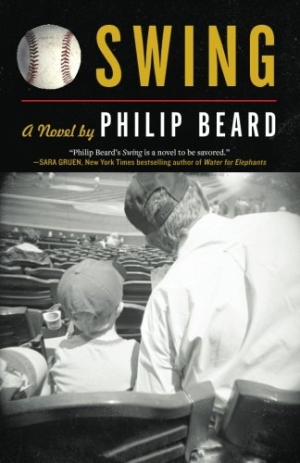Swing
Anchored by the 1971 World Series, questions of mortality, heroism, and infidelity help this outstanding novel transcend the sports genre.
There are many baseball novels that are not really about baseball, and Philip Beard’s Swing is one of them. Swing centers on English professor Henry Graham and his boyhood relationship with John Kostka, a man who’s missing the lower half of his body and moves by placing his hands on the ground and swinging himself. Both Pirates fans, the two quickly grow close against the backdrop of the World Series. But this relationship is merely a window through which the reader views Henry’s damaged families in chapters alternating between 1971 and the present. Questions of infidelity, mortality, and heroism are examined, with affecting honesty and realism.
Beard’s characters are flawed but inherently likeable, and he allows us to know them intimately, so their missteps and misfortunes hit like a punch in the gut. Every character—the absent father, the troubled sister, the mysterious wonder that is John Kostka—feels alive due to Beard’s skillfully simple prose and dialogue. Beard uses both present and past tenses in telling his story, and the Pirates are both an anchor that the story’s characters revolve around, as well as a metaphor for the happenings in Henry’s life. Young Henry’s inner turmoil erupts when he learns of the death of Pirate star Roberto Clemente on New Year’s Eve, 1972; the scene is vivid, and memorable:
My bike had been put away for the winter so I ran, the air like a cold cinch around my lungs at first, and then burning my throat. A train whistle blew, and its distant rumbling urged me on faster still. I didn’t realize I was crying until the tears started to blur my vision, and, when my hands went to my face, it was already wet.
There’s no letdown in Swing‘s momentum; Henry’s childhood and adulthood each contain hazards and revelations, and Swing offers a consistent level of excellence in every chapter.
Reviewed by
Peter Dabbene
Disclosure: This article is not an endorsement, but a review. The publisher of this book provided free copies of the book to have their book reviewed by a professional reviewer. No fee was paid by the publisher for this review. Foreword Reviews only recommends books that we love. Foreword Magazine, Inc. is disclosing this in accordance with the Federal Trade Commission’s 16 CFR, Part 255.

